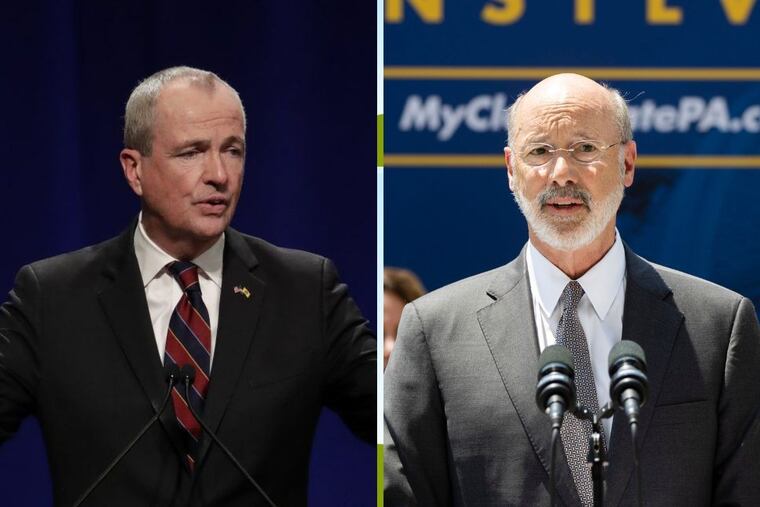Pa., N.J. governors spin budget ‘wins’ | Editorial
You can't always get what you want could be a shared mantra for both PA Gov. Tom Wolf and NJ Gov. Phil Murphy, both of whom have signed new budgets that omit what they intended to be signature programs.

Pennsylvania Gov. Tom Wolf and New Jersey Gov. Phil Murphy, both Democrats in challenging political situations, managed to sign their state budgets by the July 1 deadline after various dramas that included, in Trenton, fears of a potential government shutdown. Neither governor got everything he wanted — opponents gleefully branded Murphy as “caving in” — although more casual observers might believe otherwise, given the accentuate-the-positive official spin that always accompanies gubernatorial spending plans.
Wolf’s $34 billion budget omits his proposal to immediately boost Pennsylvania’s $7.25-per-hour minimum wage to $12 and eventually $15. The general notion of raising the minimum wage had attracted interest even among some Harrisburg Republicans, unlike a separate piece of legislation to launch the governor’s perhaps ambitious Restore Pennsylvania financing program for environmental remediation and other infrastructure projects. The GOP rebuffed Wolf’s proposal to impose a “severance" tax on natural gas drilling operations and raise $4.5 billion for the dazzling array of Restore Pennsylvania initiatives, including the improvement of broadband coverage and fighting blight in rural areas.
Wolf, who promised “to keep fighting tooth and nail for a higher minimum wage,” ought to do the same for Restore. And a working partnership between the governor’s office and legislative leaders of both parties could salvage another worthy proposal — to levy a fee on communities that rely on the Pennsylvania State Police rather than paying for their own law enforcement.
Murphy’s $38.7 billion budget provides an additional $50 million for the beleaguered NJ Transit but does not include his proposed boost in the so-called Millionaires’ Tax. Murphy couldn’t even sell this to his fellow Democrats even after proposing to link it with a one-time-only $125 credit for two million taxpayers. Whatever the merits of raising marginal rates on wealthier taxpayers, the income tax relief add-on was rightly regarded as a gimmick, including by some in Murphy’s own party, which dominates both chambers of the Legislature.
Senate President Steve Sweeney and the governor are ferocious adversaries over more than merely taxes, and Murphy has come under relentless fire from allies of South Jersey Democratic power broker (and Sweeney patron) George E. Norcross III. The latest bad blood arose after the governor’s special task force, looking into plush tax breaks to lure businesses to Camden, began publicly raising questions about the design and execution of the incentives. Murphy is right to keep shedding light on how this tax-break scheme grew to gargantuan proportions.
In Pennsylvania, the seasonal budget drama was less theatrical. Supporters of Wolf can point to more broadly popular elements of the new spending plan, such as additional money for pre-K and other public education programs. Pennsylvania Senate Democrats on Monday held a phone-in news conference to tout the Wolf budget’s $15 million boost for homelessness prevention and other worthy, housing-related efforts.
And in both Trenton and Harrisburg, the strength of the economy yielded unexpectedly robust revenues, enabling both governors to make the too-rare but essential gesture of setting money aside in their state’s rainy day fund. This is perhaps the best budget news of all.